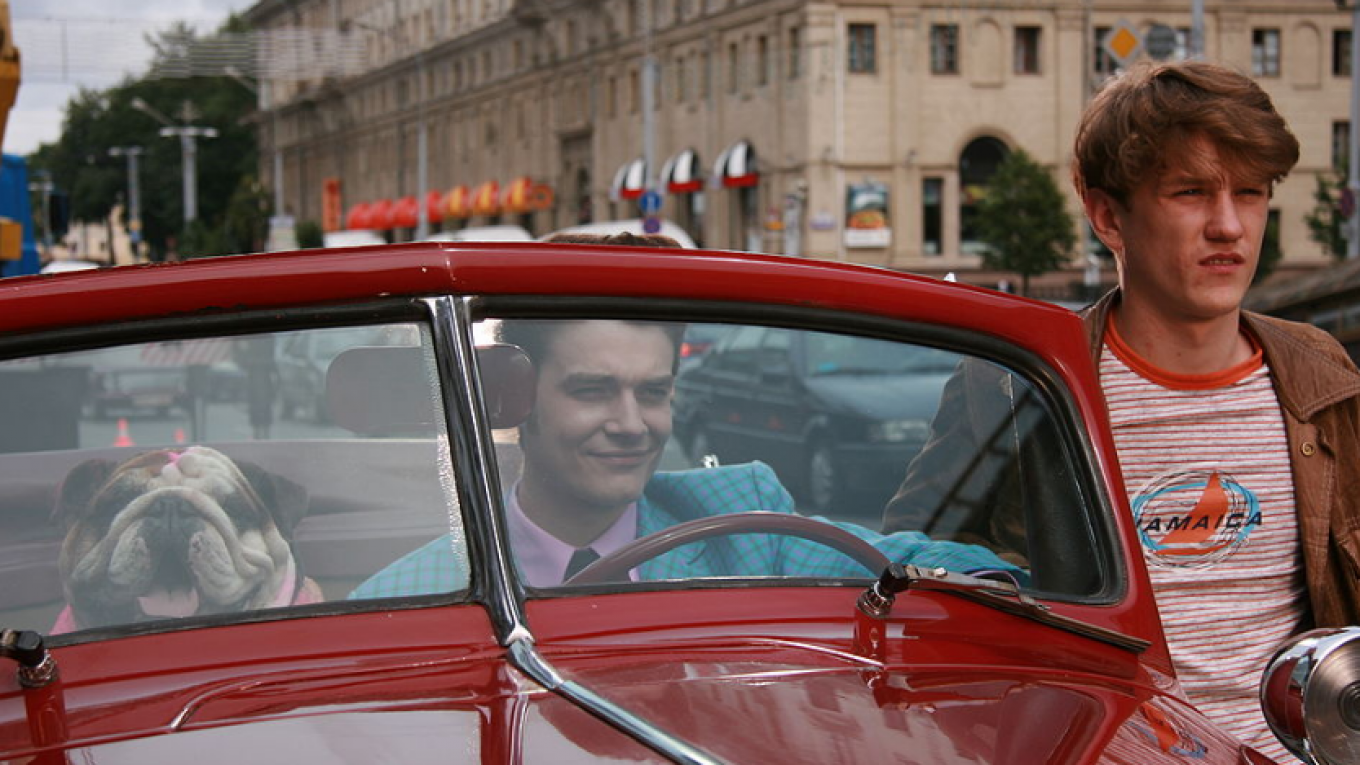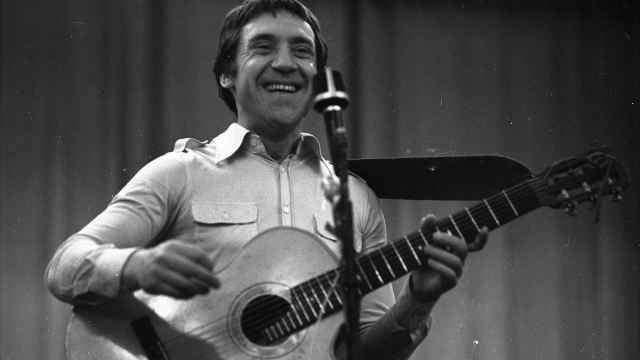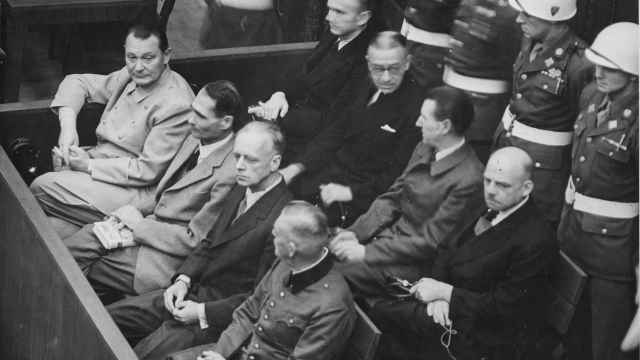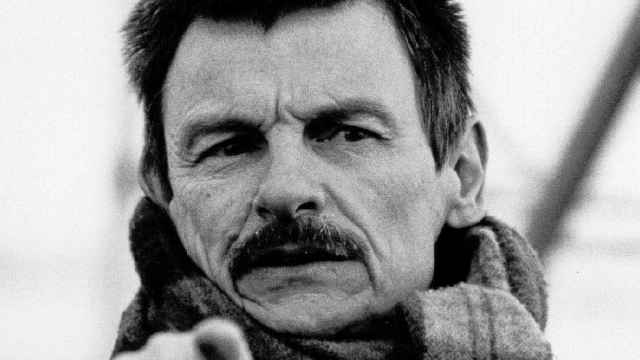Appalled or enthralled by Sunday’s election results, Moscow TV offers viewers much to enjoy as you decompress this week, including great music (modern classical and bebop), a trans-European Nobel laureate, Soviet nostalgia that actually works and the best “Borshcht Western” you’ll find east of Dodge City. Here’s your what and when.
Next Sunday marks the 110th birthday of Dmitry Shostakovich, and Kultura is honoring the composer Monday through Friday with performances of six orchestral works: Symphony No. 10 (Monday), Chamber Symphony in C minor (later Monday night), Concerto No. 1 for Piano and Orchestra (Tuesday), Symphony No. 8 (Wednesday), Concerto No. 2 for Violoncello and Orchestra (Thursday), and Symphony No. 5 (Friday). This is your chance to experience the musical breadth of a great modern composer expressed by six different orchestras and conductors in six different venues — and all for free. Thank your television and consider upgrading your speakers.
On the 110th Birthday of Dmitry Shostakovich К 110-летию со дня рождения Дмитрия Шостаковича. Kultura, Monday-Friday at 5:25 p.m. and Tuesday at 12:40 a.m.
Poles, Balts and Americans don’t often appear in positive contexts on Moscow TV, so take advantage of the Who’s Who (Кто есть кто) channel’s airing of The World of Czeslaw Milosz (2012) before somebody Downtown finds out about it. Monday’s segment is the first of this excellent six-part Lithuanian documentary on the Nobel prize-winning Polish-American poet, essayist, scholar and diplomat. Moscow viewers will find much to admire in Milosz (1911-2004), an anti-totalitarian, pan-European humanist of rare erudition who was a great admirer of the works of Dostoevsky — and lectured on them for decades in California. This series is in Polish, English and Lithuanian with Russian subtitles, which quite aptly symbolizes the transnational richness of a life that succeeded at uniting cultures while ignoring borders.
The World of Czeslaw Milosz Мир Чеслава Милоша. Who’s Who, Monday at 5:05 a.m. (then Tuesday through Saturday in varying time slots).
From the late 1950s to the mid ‘60s it was occasionally possible to write, produce, distribute and even win prizes for Soviet movies that were heartfelt, entertaining, “very Russian” and — are you sitting down? — almost entirely free of political overtones. “There Is Such a Lad” (1964), the debut feature by writer-director-actor Vasily Shukshin (1929-1974), was just such a film. This delightful comedy-drama about an Altai truck driver was, as one recent critic put it, “so depoliticized [it makes] the bunny rabbit cartoon series ‘Nu, pogodi!’ look like hard-core Communist propaganda.” Leonid Kuravlyov turned the colorful Pasha Kolokolnikov, “an honest lad who lies a lot,” into a folk hero of remarkable humor and depth whose odyssey through rural Russia in a ГАЗ 6-wheeler endeared him to millions. Tune in for a rare bit of Soviet nostalgia that’s really worth being nostalgic about.
There Is Such a Lad Живет такой парень. Zvezda, Tuesday at midnight
An enduring favorite with Russian audiences of the last century, Vladimir Motyl’s “White Sun of the Desert” (1969) is also a strong contender for the title of All-time Best Borscht Western. Motyl expertly transferred a classic shoot-‘em-up premise from America’s Wild West to the Russian Wild East of Central Asia in the early 1920s. There’s great adventure, real exotica and good laughs, along with a surprising dose of nobly-voiced Russian nationalism (“Мне за державу обидно” /“It pains me to see the country suffer”) as well as a fistful of phrases that endure in the language (including “Восток – дело тонкое”/“The East is a subtle business”). It took a big thumbs up from Western fan Leonid Brezhnev to get “White Sun” into theaters after years of censor-mandated tinkering, but once there it drew some 50 million fans to follow the General Secretary’s tracks — and you should too, podner.
White Sun of the Desert Белое солнце пустыни. Dom Kino, Wednesday at 12:20 p.m.
Thursday also brings you a memorable cross-cultural spectacle in Valery Todorovsky’s “Hipsters” (2008), a musical comedy-drama that draws on the stilyagi youth subculture of the 1950s. These were hip young Russians in sharp clothes and big hair who loved Western bebop, boogie-woogie, rock ‘n’ roll and being “different” — even if (and sometimes especially if) these tastes became lifestyle choices that made them “ideological enemies” in their homeland. There’s plenty of dancin’ and romancin’ to go with the fine period atmospherics here, and the tracks by classic Russian groups (including Mashina vremeni, Kino, Zoopark and Nautilus Pompilius) will give your ears, and maybe your feet, a good workout. Push the table back, put on your blue suede shoes, tune in and see what happens.
Hipsters Стиляги. TV1000. Russkoye Kino, Thursday at 8:10 a.m.
Fifty years ago Andrei Konchalovsky was nominated for the best director award at the Venice Film Festival for “First Teacher” (1965). He didn’t win, but lead Natalia Arinbasarova did beat Jane Fonda to the best actress prize and soon became Konchalovsky’s second wife. On Friday Kultura gives you a chance to see what this young duo impressed the Italians with back in the day. Based on a Chingiz Aitmatov story of the collision of Soviet power and Asian tradition in Kyrgyzstan — Kirghizia — of the early 1920s, “Teacher” impressed critical Moscow audiences of the mid-1960s and augured well for the debuting director’s career. And indeed, while Konchalovsky has had his ups and downs, his sense of symmetry is impressive: last week he brought his new film “Paradise” to the Venice Film Festival and for it collected the Silver Lion as best director.
First Teacher Первый учитель. Kultura, Friday at 10:20 a.m.
Mark H. Teeter is the editor of Moscow TV Tonite on Facebook
A Message from The Moscow Times:
Dear readers,
We are facing unprecedented challenges. Russia's Prosecutor General's Office has designated The Moscow Times as an "undesirable" organization, criminalizing our work and putting our staff at risk of prosecution. This follows our earlier unjust labeling as a "foreign agent."
These actions are direct attempts to silence independent journalism in Russia. The authorities claim our work "discredits the decisions of the Russian leadership." We see things differently: we strive to provide accurate, unbiased reporting on Russia.
We, the journalists of The Moscow Times, refuse to be silenced. But to continue our work, we need your help.
Your support, no matter how small, makes a world of difference. If you can, please support us monthly starting from just $2. It's quick to set up, and every contribution makes a significant impact.
By supporting The Moscow Times, you're defending open, independent journalism in the face of repression. Thank you for standing with us.
Remind me later.







